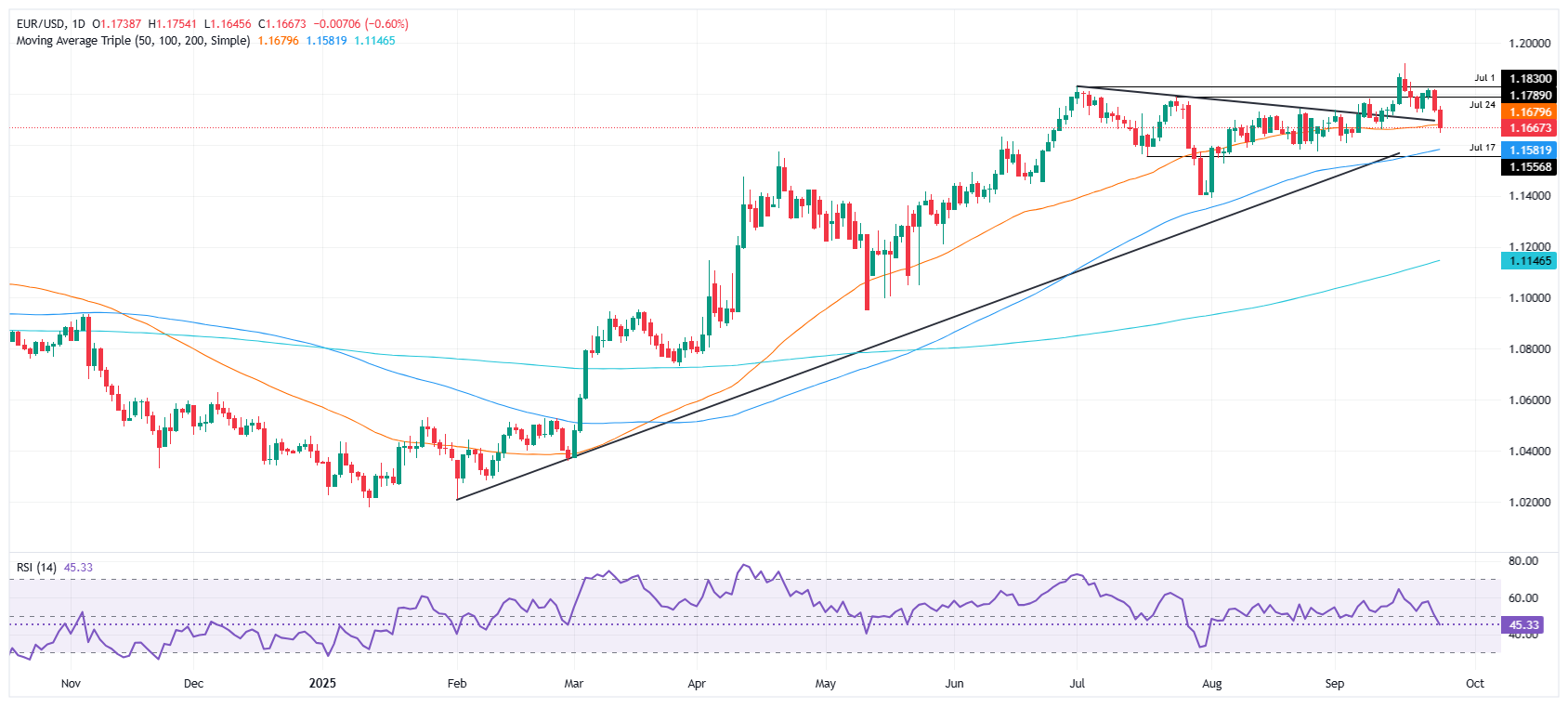Created
: 2025.09.26













![]() 2025.09.26 07:41
2025.09.26 07:41
EUR/USD tumbled sharply below 1.1700 on Thursday, extending its losses below two technical support levels, which opens the door for further downside. Strong jobs market data from the United States (US) pushed the Euro lower. At the time of writing, the pair trades at 1.1667 down 0.60%.
The US economic docket was packed as not only jobs data revealed but also figures for the final revision of the Gross Domestic Product (GDP), Durable Goods Orders and Existing Home Sales.
Initial Jobless Claims for the week ending September 20 revealed the labor market remains solid, while the economy is buoyant surpassing estimates for growth of 3.3% YoY. Durable Goods Orders were outstanding as orders for aircraft soared 21.6%, while Existing Home Sales dipped but came above consensus.
Federal Reserve officials crossed the wires, led by Regional Fed Presidents Schmid, Goolsbee and Governor Stephen Miran.
The docket in the Eurozone was light as Germany GfK Consumer Sentiment showed an improvement, yet it remains negative. The jump in income expectations was the main driver of the increase in the overall sentiment.
EUR/USD shifted direction as the formation of an 'evening star' spurred a sell-off pushing the exchange rate below 1.1700. The pair ended Thursday's session at around 1.1660s, below key technical support turned resistance, the 20-day SMA at 1.1735.
At the time of writing, the pair hovers below the 50-day SMA of 1.1678, which would be the first resistance level for buyers trying to reclaim 1.1700. A breach of the latter will expose 1.1750 ahead of the 1.1800 mark.
Conversely, if EUR/USD slides below 1.1650, the next support would be 1.1600, followed by the 100-day SMA At 1.1587.

The Euro is the currency for the 19 European Union countries that belong to the Eurozone. It is the second most heavily traded currency in the world behind the US Dollar. In 2022, it accounted for 31% of all foreign exchange transactions, with an average daily turnover of over $2.2 trillion a day. EUR/USD is the most heavily traded currency pair in the world, accounting for an estimated 30% off all transactions, followed by EUR/JPY (4%), EUR/GBP (3%) and EUR/AUD (2%).
The European Central Bank (ECB) in Frankfurt, Germany, is the reserve bank for the Eurozone. The ECB sets interest rates and manages monetary policy. The ECB's primary mandate is to maintain price stability, which means either controlling inflation or stimulating growth. Its primary tool is the raising or lowering of interest rates. Relatively high interest rates - or the expectation of higher rates - will usually benefit the Euro and vice versa. The ECB Governing Council makes monetary policy decisions at meetings held eight times a year. Decisions are made by heads of the Eurozone national banks and six permanent members, including the President of the ECB, Christine Lagarde.
Eurozone inflation data, measured by the Harmonized Index of Consumer Prices (HICP), is an important econometric for the Euro. If inflation rises more than expected, especially if above the ECB's 2% target, it obliges the ECB to raise interest rates to bring it back under control. Relatively high interest rates compared to its counterparts will usually benefit the Euro, as it makes the region more attractive as a place for global investors to park their money.
Data releases gauge the health of the economy and can impact on the Euro. Indicators such as GDP, Manufacturing and Services PMIs, employment, and consumer sentiment surveys can all influence the direction of the single currency. A strong economy is good for the Euro. Not only does it attract more foreign investment but it may encourage the ECB to put up interest rates, which will directly strengthen the Euro. Otherwise, if economic data is weak, the Euro is likely to fall. Economic data for the four largest economies in the euro area (Germany, France, Italy and Spain) are especially significant, as they account for 75% of the Eurozone's economy.
Another significant data release for the Euro is the Trade Balance. This indicator measures the difference between what a country earns from its exports and what it spends on imports over a given period. If a country produces highly sought after exports then its currency will gain in value purely from the extra demand created from foreign buyers seeking to purchase these goods. Therefore, a positive net Trade Balance strengthens a currency and vice versa for a negative balance.
![]()
Created
: 2025.09.26
![]()
Last updated
: 2025.09.26

FXStreet is a forex information website, delivering market analysis and news articles 24/7.
It features a number of articles contributed by well-known analysts, in addition to the ones by its editorial team.
Founded in 2000 by Francesc Riverola, a Spanish economist, it has grown to become a world-renowned information website.
We hope you find this article useful. Any comments or suggestions will be greatly appreciated.
We are also looking for writers with extensive experience in forex and crypto to join us.
please contact us at [email protected].
Disclaimer:
All information and content provided on this website is provided for informational purposes only and is not intended to solicit any investment. Although all efforts are made in order to ensure that the information is correct, no guarantee is provided for the accuracy of any content on this website. Any decision made shall be the responsibility of the investor and Myforex does not take any responsibility whatsoever regarding the use of any information provided herein.
The content provided on this website belongs to Myforex and, where stated, the relevant licensors. All rights are reserved by Myforex and the relevant licensors, and no content of this website, whether in full or in part, shall be copied or displayed elsewhere without the explicit written permission of the relevant copyright holder. If you wish to use any part of the content provided on this website, please ensure that you contact Myforex.
Myforex uses cookies to improve the convenience and functionality of this website. This website may include cookies not only by us but also by third parties (advertisers, log analysts, etc.) for the purpose of tracking the activities of users. Cookie policy